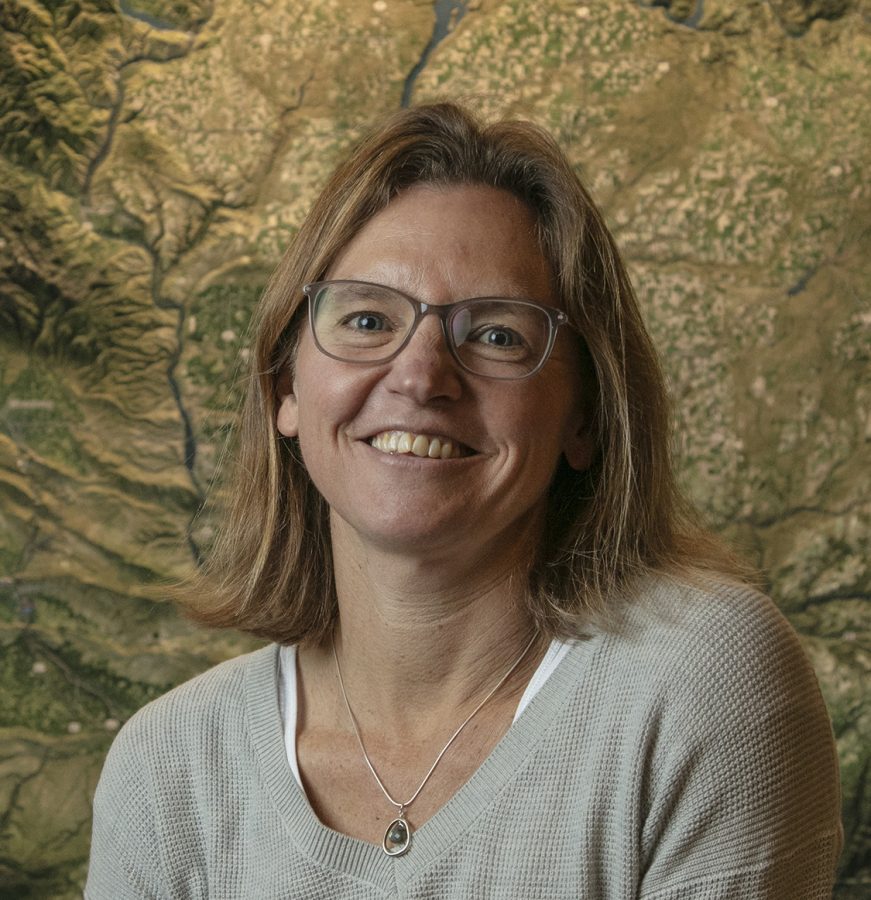Professor Anne Egger recognized as Fellow by the American Association for the Advancement of Science
David Dick/Central Washington University
Dr Anne E. Egger has been elected into the 2021 class of the American Association for the Advancement of Science.
February 9, 2022
A landscape tells an untold story and writes a record of its history, if the viewer knows how to read it. By looking at a landscape with an observant eye and asking questions about what is seen, a grasp of what happened can be seen there through the soil, the sediment and the slope of the land.
“I think of science as a way of looking at the world, making observations and trying to understand what’s going on,” Anne Egger said, who is executive director of the National Association of Geoscience Teachers (NAGT) and professor of Geological Sciences and Science Education.
Award and Achievements
Egger has been teaching and contributing to the geoscience community for over 20 years and has recently been awarded the title of fellow in the American Association for the Advancement of Science (AAAS) in acknowledgement of her contributions.
Contributions she has made in the past included her work in the NAGT, becoming the Editor-in-Chief of the Journal of Geoscience Education and later becoming the president of the journal.
According to the AAAS website, “Fellows are a distinguished group of scientists, engineers and innovators who have been recognized for their achievements across disciplines, from research, teaching and technology, to administration in academia, industry and government, to excellence in communicating and interpreting science to the public.”
Egger has been recognized for her excellence in science education by her peers who nominated her for the fellow title.
Egger’s View of Geology
STEM fields are full of challenges and obstacles, and one way that Egger conquers all the obstacles that she comes across is by keeping a positive outlook.
“I tend to think of challenges as opportunities,” Egger said. “What am I struggling with that I can either use that to shift my focus or figure out a path through or around it?”
A time she needs a positive outlook is when acknowledging the connection between analyzing nature and climate change. Rather than thinking of it as a scientific issue to solve, she likes to keep positive by acknowledging that people everywhere are finally becoming aware of the climate change issue so they can finally take more steps to mitigate it.
Egger said she is glad the lack of diversity is finally being acknowledged in the field of geology. Along with lack of diversity, she said there were issues with lack of recognition for those who made contributions in the field. She said she is glad to see these matters changing as more people are starting to enter the field and more people are starting to have their work recognized.
Discovering the Love for Teaching
When Egger first started college, she studied music. She took classes for music theory, singing and piano and composition, but soon changed her focus to biology after discovering that her passion for music was better fit as a personal hobby than an occupation.
Egger took a job as a river guide in the Desert Southwest, and she fell in love with the landscape of the area. Desert Southwest has little vegetation, so this spurred her to change her focus from biology to geology.
It was also during this time as a river guide that Egger discovered how much she liked teaching.
“Being with people out in a place where they have plenty of time to kind of stare at things and begin to ask questions,” Egger said. “It’s what got me really excited at the idea of being a teacher.”
This passion continued to grow as she went back to graduate school, according to Egger.She witnessed curiosity and passion while in school, and felt the joys of teaching really start to manifest when being asked questions by those who really want to learn.
A memory Egger has of being astounded by the beauty of science was during an astrology class she took in college, while looking at Saturn.
“I had this idea in my head that it would be either a pinprick or it would be a beautiful, colorful image,” Egger said.
But Egger said what she saw was even cooler than what she had expected.
“It was that big and had two little teacup handles on it because we were viewing it on its side, but you could see the rings, and it was bright,” Egger said.
According to Egger, seeing this planet’s existence was made even better as it symbolized the fruit of her labor, as she had to calculate where it would be and what settings the telescope would need in order to see it.
Egger said, “It was using math and using geometry to then, oh my gosh, see this amazing thing in the sky.”
Egger wants to see others be curious about the beauty of nature.
“Everyone should have an understanding of this amazing planet that we live on, and be able to ask questions about it, be curious and ask questions,” Egger said. “I think people might be afraid to ask questions, that they might look stupid. I get inspired by seeing people get into science, and become teachers of science so they can help other people become interested and inspired.”

